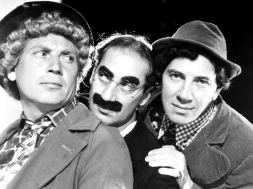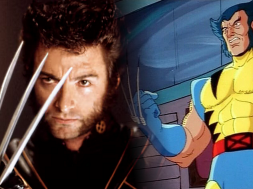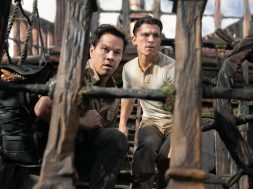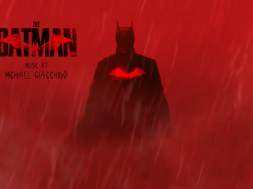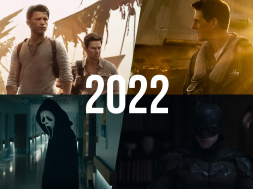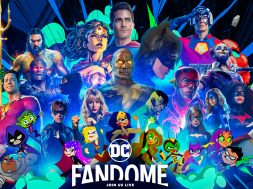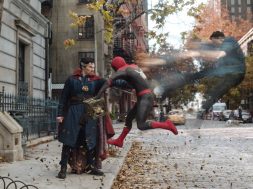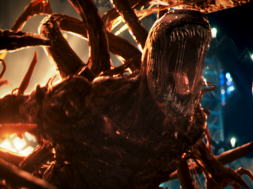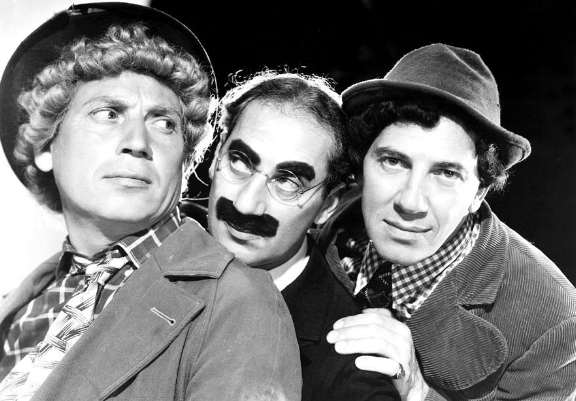
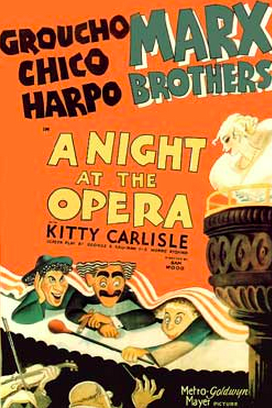
Earlier this week it was announced that Rob Zombie plans to make a biopic of Groucho Marx, based on the book
Raised Eyebrows: My Years Inside Groucho’s House by Steve Stoliar. In light of this development, it seems appropriate to revisit the work of this iconic comic talent with a film that was made almost 80 years ago, A Night At The Opera (1935).
For those not familiar with their work, the Marx Brothers were a troop of comic actors who went from stage to screen in the early 1930s. Throughout their working lives, they each played the same stock character. Granted, their names changed each time, but the voice and costume is more-or-less consistent. Groucho‘s on screen persona wore a suit with grease paint eyebrows and moustache. Chico adopted an Italian accent with a tie and blazer. Both these characters spark off each other for large segments of their many movies. Finally, Harpo, because of his nasally voice that was thought to potentially irritate the movie-going public, was mute on screen. In fact, his voice is only heard when he and his brothers sing ‘Sweet Adeline’ at the start of Monkey Business (1931). Harpo wore a disheveled outfit complete with a crumpled hat and a cane with a horn built into it.
The story of A Night at the Opera is simple enough. It is a love story between two opera singers, Rosa and Richardo (played by Kitty Carlisle and Allan Jones). Rosa is an opera singer traveling to America with The New York Opera Company to make her US debut. However, Richardo, despite his great talent, cannot come with her. Or at least not legally. With the help of friends Fiorello (played by Chico Marx) and Tomasso (played by Harpo), he travels to America on the same boat as his beloved, having snuck aboard in the trunk of The New York Opera Company‘s Otis B. Driftwood (played by Groucho).
Following such a plot may seem confusing to us modern viewers, but in the film it all seems cohesive, fitting together in its own strange way. In any case, the plot – as with many Marx Brothers movies – is secondary to the gaffs. Few notice that Carlisle and Jones, playing the opera singers, don’t have Italian accents, certainly not convincing ones, but nobody cares, nor should they. For most of the movie, all attention is fixed on the anarchy and alacrity of the three brothers.
Groucho (born Julius Henry Marx) is on sparkling form in every scene, dealing wise cracks off the cuff that land like tennis serves. A detective calls at the home of Driftwood looking for the stowaways (illegal immigrants, to use the modern term) he is suspected of harbouring. He wonders why Driftwood, a man who professes to live alone would set the table for four. Driftwood brushes this question off with characteristic nonchalance by saying, “My alarm clock is set for 8, that doesn’t prove a thing.” That remark may seem a little bloodless written down but, fortunately, clips of the famous movie have been preserved to add a little colour:
Besides the hijinks, the film features no shortage of musical numbers. With a title like A Night At The Opera, some may think it sounds a little obvious. All the Marx Brothers films feature some music and it has divided fans historically. Some think it an irksome distraction from the dialogue, while others (myself included) respectfully disagree. Groucho, for instance, played the guitar and sang in Horse Feathers (1932), yet for all his talent when it came to music, he was outclassed by his younger brothers, Chico on piano:
and Harpo on the harp, although he too is known to make use of the keyboard in his own way:
The music scenes can be comic one moment and hold you spellbound the next, which is always a brief and welcome reprieve from the chaos.
Watching these films in this day and age can make them seem dated, perhaps most obviously in the scenes between Groucho and his foil, played by Margaret Dumont. Still, they are bound endure, even if only as ‘cultural curiosities’. Yet, for me, these film will always be funny. A Night At The Opera, like so many of their films, has a wit and a speed that makes them still seem fresh, which all the stock characterisation and the attitudes of the time cannot erase. Whether Zombie makes a good movie remains to be seen, but with classics like these, he’s certainly got his work cut out for him!
Do you enjoy the Marx Brothers movies? Do you have a personal favourite? What are your hopes for the upcoming bio-pic? Let us know in the comments!
